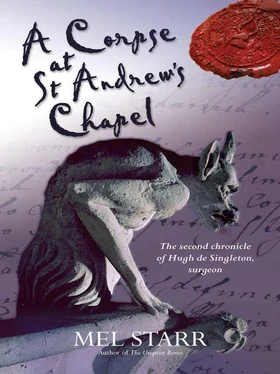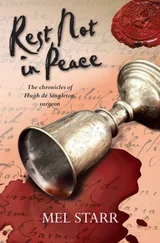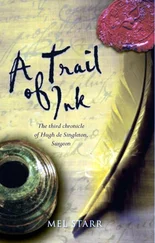Mel Starr - A Corpse at St Andrew's Chapel
Здесь есть возможность читать онлайн «Mel Starr - A Corpse at St Andrew's Chapel» весь текст электронной книги совершенно бесплатно (целиком полную версию без сокращений). В некоторых случаях можно слушать аудио, скачать через торрент в формате fb2 и присутствует краткое содержание. Год выпуска: 2010, Издательство: Kregel Publications, Жанр: Исторический детектив, на английском языке. Описание произведения, (предисловие) а так же отзывы посетителей доступны на портале библиотеки ЛибКат.
- Название:A Corpse at St Andrew's Chapel
- Автор:
- Издательство:Kregel Publications
- Жанр:
- Год:2010
- ISBN:нет данных
- Рейтинг книги:5 / 5. Голосов: 1
-
Избранное:Добавить в избранное
- Отзывы:
-
Ваша оценка:
- 100
- 1
- 2
- 3
- 4
- 5
A Corpse at St Andrew's Chapel: краткое содержание, описание и аннотация
Предлагаем к чтению аннотацию, описание, краткое содержание или предисловие (зависит от того, что написал сам автор книги «A Corpse at St Andrew's Chapel»). Если вы не нашли необходимую информацию о книге — напишите в комментариях, мы постараемся отыскать её.
A Corpse at St Andrew's Chapel — читать онлайн бесплатно полную книгу (весь текст) целиком
Ниже представлен текст книги, разбитый по страницам. Система сохранения места последней прочитанной страницы, позволяет с удобством читать онлайн бесплатно книгу «A Corpse at St Andrew's Chapel», без необходимости каждый раз заново искать на чём Вы остановились. Поставьте закладку, и сможете в любой момент перейти на страницу, на которой закончили чтение.
Интервал:
Закладка:
Some may accuse me of forgetting purgatory. I have not. While a student at Oxford I rented from another scholar a Gospel of St John and copied it. These pages I have read many times, so that I remember many of the passages. Jesus said of himself, “Therefore if the Son makes you free, you shall be free indeed.”
If our Lord has made a man free, how can he then be imprisoned in purgatory? And how is a man made free? The scriptures speak plainly: through faith in Christ, the Son of God, who takes away the sins of the world. If Christ has taken away Alan’s sins, why must he be punished for them in purgatory?
I will again be accused of listening overmuch to Master John Wyclif, who has taught similar views. And purgatory has been a part of church tradition for many centuries. But again, I hold with Master Wyclif that a tradition must be supported by scripture to be valid. I find no place for purgatory in holy writ. But I am no smasher of temple idols, howso they might need to be toppled. Let others challenge the bishops; I wish only to heal men’s broken bodies. Perhaps I am a coward.
Alan the beadle left no funds with which his widow might endow an oratory where monks could pray him out of purgatory. When it comes Lord Gilbert’s time to die, Petronilla will certainly furnish a chapel in some monastery where prayers will be said for his soul forever. Will Lord Gilbert win release from purgatory before Alan? Our Lord said ’twas easier for a camel to pass through the needle’s eye than for a rich man to enter heaven. Then what of purgatory and endowed chapels and perpetual prayers? Although Lord Gilbert is generous to the poor, it seems to me his soul would be the better if he gave more to them now, while he yet lives, and less to the monks when he is dead. If he gives enough to the poor, he might not need to give even a penny to the monks.
Well, these are matters for theologians and scholars. My mind was arrested and returned to the churchyard when John Holcutt tapped me on the shoulder and brought me from my musing.
“Richard Hatcher,” he said, “has found a dead lamb this morning.”
There is nothing unusual about a dead lamb in springtime, but something in the reeve’s tone told me that, in this case, there was. I turned to John as he spoke.
“Dead an’ half eaten, ’twas. Throat tore out an’ guts spread about…what wasn’t ate up. You think ’twas the beast which attacked Alan?” John asked.
“I know of no other cause,” I admitted. “And late last night I walked the castle wall and heard some beast howl. We must seek Father Thomas’ absolution, for I think we must forsake our Good Friday obligations and hunt the beast while its track may be found.”
I sent the reeve to the castle to organize the hunt while I sought the vicar. I found him in the church, preparing for the Good Friday mass which would soon begin. Father Thomas scurried from images to crucifix, adjusting veils and seeing to the good order of his church. Townsmen and villeins were beginning to arrive. Most wore the grey and brown cotehardies they donned every day, but those who could afford it wore black, or sometimes yellow, to honor the day.
I awaited the vicar at the Easter Sepulcher, where shortly the unveiled cross would be placed for the allotted time, to be withdrawn with much rejoicing Easter morn. Some churches have a small room reserved for this rite, but at the Church of St Beornwald a niche in the chancel wall, boarded up with thick oak planks, serves this duty.
Satisfied that all was in readiness, Thomas withdrew from the niche to find me standing behind him. “Ah…Master Hugh. You startle me.”
I apologized, and explained the need which would draw a dozen of us from the mass this day. A marauding beast is a serious matter, and the priest knew it. The loss of a lamb was bad enough. What of the calves new born which would soon be put out with their mothers in the meadows and fallow land? Father Thomas gave his blessing to our pursuit, and I made my way out through the porch as others entered.
Shillside had got wind of the chase and was at the castle with his son, William, a reedy lad of seventeen years, who was twitching with enthusiasm. John and Richard had gathered several more villeins and tenants and the fewterer, with two old hounds Lord Gilbert had left behind in his kennel at Bampton when he removed to Pembroke before St Crispin’s Day last autumn.
We followed Richard Hatcher to the meadow. Crows and circling buzzards had already taken note of the carcass. The field was west of the town. I had heard no beast howl from that quarter, but I know little of wolves. Perhaps, I thought, they are silent when at the hunt.
The early spring grass was not grown long enough to be beaten down, so no path leading to or from the lamb was visible. And while the sod was soft from spring rains, it was not so pliant as to leave behind the track of a wolf or any other creature.
The castle fewterer brought the hounds to the slain lamb and led them around it in a circle. The dogs sniffed bemusedly at the lamb and the turf around it.
“’Tis odd,” the fewterer muttered. “They seem not interested. When Squire was young,” he motioned toward the white and black hound, “he’d a’ been off in a flash…an’ Tawny, too, though she was never the hunter as Squire was.”
He led the hounds in a circle once again, larger this time, and noted a place where both animals took some time snuffling about the meadow grass. When the circle was completed, with no other sign that the dogs had found an interesting trail, he returned to the spot, unleashed them, and ordered them off on the scent.
The hounds obeyed with scant enthusiasm. “Squire be ten years old,” the fewterer remarked, as if to excuse the animal’s lack of zeal.
The hounds followed their noses to the edge of the fallow ground, then turned south along a hedgerow which separated the meadow from a newly plowed field to the east. The dogs followed this barrier, with the hunting party close behind, to the edge of a wood. No coppicing had been done in this grove, so there was little to hinder the advance of our company. Ancient trees so blotted the summer sun here that little vegetation grew on the forest floor.
We kept the hounds in view readily enough, for they proceeded at a leisurely pace, though there was little undergrowth to impede them. Two archers in the party notched arrows, unwilling to be caught unready should a wolf suddenly appear from behind an oak. They need not have been so cautious.
The forest gave way to meadow again, and we entered bright sunlight on the Bishop of Exeter’s lands. We followed the hounds to another hedgerow, beyond which was a field that the bishop’s villeins had newly plowed.
The track then turned north, as the hounds followed the wall. I began to wonder if the beast we trailed was old, or injured, that it did not leap a hedgerow or fence to continue its path, but instead went round.
We had come near to the place where the beast would have been when I heard it last in the night. But the track seemed wrong. Unless the hounds were backtracking, following the path the animal made as it sought a meal, rather than the trail it left after it slew the lamb.
The track plunged once again into the forest, and we followed until, 200 paces beyond, the wood ended on the banks of Shill Brook, a quarter-mile downstream from Mill Street Bridge.
“This is a waste,” I told the fewterer. “The dogs are backtracking. We go where the beast was, not where it now is.”
“’Twas the only scent the hounds found,” he replied defensively. “An’, even if ’tis so, we may come upon the beast’s lair, where it lays in the day before seeking prey at night.”
I agreed that might be so, knowing little of wolfish habits, and predicted that when we waded across the brook, the hounds would soon turn east. I must cease making prophetic statements. They seem usually to be wrong. When we crossed the stream, the track did not lead east. It led nowhere.
Читать дальшеИнтервал:
Закладка:
Похожие книги на «A Corpse at St Andrew's Chapel»
Представляем Вашему вниманию похожие книги на «A Corpse at St Andrew's Chapel» списком для выбора. Мы отобрали схожую по названию и смыслу литературу в надежде предоставить читателям больше вариантов отыскать новые, интересные, ещё непрочитанные произведения.
Обсуждение, отзывы о книге «A Corpse at St Andrew's Chapel» и просто собственные мнения читателей. Оставьте ваши комментарии, напишите, что Вы думаете о произведении, его смысле или главных героях. Укажите что конкретно понравилось, а что нет, и почему Вы так считаете.












